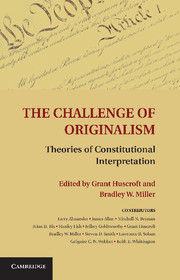Book contents
- Frontmatter
- Contents
- Preface
- Contributors
- The Challenge of Originalism: Theories of Constitutional Interpretation
- Part One Exposition and Defense
- Part Two Interpretation and Intention
- 4 Simple-Minded Originalism
- 5 The Intentionalist Thesis Once More
- 6 Origin Myth: The Persons Case, the Living Tree, and the New Originalism
- Part Three Originalism and Constitutional Settlement
- Part Four Challenges and Critiques
- Index
- References
6 - Origin Myth: The Persons Case, the Living Tree, and the New Originalism
from Part Two - Interpretation and Intention
Published online by Cambridge University Press: 07 October 2011
- Frontmatter
- Contents
- Preface
- Contributors
- The Challenge of Originalism: Theories of Constitutional Interpretation
- Part One Exposition and Defense
- Part Two Interpretation and Intention
- 4 Simple-Minded Originalism
- 5 The Intentionalist Thesis Once More
- 6 Origin Myth: The Persons Case, the Living Tree, and the New Originalism
- Part Three Originalism and Constitutional Settlement
- Part Four Challenges and Critiques
- Index
- References
Summary
Introduction
Originalism in Canada – to put it charitably – has “never gained much judicial or scholarly support,” and Edwards v. AG Canada has been cast as its bête-noir. In the Persons Case, five women successfully challenged the Canadian federal government's interpretation of section 24 of the British North America Act, 1867 as blocking the appointment of women to the Senate. Like Brown v. Board of Education in the United States, the Persons Case has become powerfully symbolic of how judicial review under the constitution can be used to attack social injustice. Since the early 1980s, it has also been identified by the Supreme Court of Canada as the fount of non-originalist constitutional interpretation in Canada, the constitutional bedrock on which the methodology of contemporary “living tree” Charter interpretation is founded. These two aspects of the case are related: The possibility of judicially led social progress is often said to depend on the availability of non-originalist interpretative methodology. The account of the Persons Case as rejecting originalism and establishing the “living tree” methodology of constitutional interpretation in Canada is the focus of this chapter.
The Persons Case is often read as having delivered the death blow to originalist constitutional interpretation in Canada, providing two objections to any proposal to engage with originalist constitutional interpretation. At the level of doctrine, the rejection of originalism in the Persons Case has, over seventy-five years, been firmly established as a matter of Canadian constitutional bedrock. As a matter of principle, the Persons Case demonstrates that originalist interpretation risks binding political communities to the injustices of the past. These two objections have a ready appeal. In the Persons Case, the Privy Council not only overturned the Supreme Court of Canada, but rebuked it for deferring to the intentions of the framers when interpreting the British North America Act, 1867 (BNA Act) as not allowing women to be appointed to the Senate. The Privy Council derided the Supreme Court's “appeal to history” and “narrow and technical” methodology, preferring instead a “large and liberal” style of interpretation that conceived of the constitution as “a living tree capable of growth and expansion within it natural limits.” The Privy Council saw itself as faced with two options: (1) joining the Supreme Court in following the path of constitutional originalism to a morally repugnant result, or (2) establishing a non-originalist methodology that would enable courts to respond justly to changing social needs. The Privy Council, on this reading, chose the latter.
- Type
- Chapter
- Information
- The Challenge of OriginalismTheories of Constitutional Interpretation, pp. 120 - 146Publisher: Cambridge University PressPrint publication year: 2011
References
- 3
- Cited by



